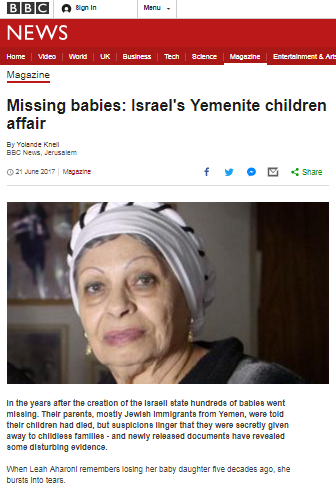On June 21st an article by Yolande Knell appeared in the ‘Magazine’ section of the BBC News website as well as on its Middle East page under the title “Missing babies: Israel’s Yemenite children affair“. The article is introduced as follows:
“In the years after the creation of the Israeli state hundreds of babies went missing. Their parents, mostly Jewish immigrants from Yemen, were told their children had died, but suspicions linger that they were secretly given away to childless families – and newly released documents have revealed some disturbing evidence.”
It opens with the 50 year-old story of a woman who “had given birth to premature twins”.
“But when Leah’s husband visited soon afterwards, only one of the twins was there. The other, Hanna, had died, he was informed.
Leah was shocked not to be shown a body or a grave – a common feature of such stories…” [emphasis added]
A similar approach to the burial of babies who died during or shortly after childbirth was of course the norm in Britain right up to the 1960s and even later – but readers of this article are not given that context.
The historical background to the story provided by Knell is limited to a few lines.
“Leah had experienced many calamities long before the loss of her baby. As a child, she and her family had joined thousands of Jews fleeing violence in Yemen. They were robbed as they trekked from one end of the country to the other and Leah was reduced to begging for food. Then they were rescued in an airlift known as Operation Magic Carpet. […]
They had arrived, malnourished and penniless, during the first Arab-Israeli war.”
Although the fact that the new immigrants from Yemen arrived in Israel in poor health after long journeys on foot to the overcrowded transit camps in Aden where disease was rife and mortality rates high is very relevant to the story she is telling, Knell does not expand further.
Despite the fact that three separate commissions of inquiry have determined that the overwhelming majority of the children died, Knell nevertheless amplifies unsupported allegations.
“Many Yemenite Jews spent periods in transit camps before being settled in homes, and stories of babies going missing began to arise immediately.
Some reports talk of children disappearing after visits to the camps by wealthy American Jews.
In other cases children appeared to be recovering in hospitals from relatively minor ailments when the parents were suddenly told they had died.
On kibbutzes [sic], where some of the Yemenites settled, it was typical for youngsters to be separated from their parents and looked after together, and here too it’s said that some children vanished.
Estimates of the number of missing children range from hundreds to thousands.
In many cases the parents believe their children were really kidnapped and given or sold to families of European Jews – occasionally Holocaust survivors who had lost their children – or Americans.”
Only in the twenty-seventh paragraph of her article does Knell tell readers that:
“Three government inquiries have looked into the Yemenite Children Affair, as it is known, since the 1960s, and all have concluded that most children died of diseases and were buried without their parents being informed or involved.”
However, that is immediately followed by a paragraph again promoting entirely unproven speculations:
“But many of the families involved suspect a cover-up and continue to believe that there was an organised operation to snatch children, involving health workers and government officials.”
Later on in the article, Knell half concedes that allegations of “an organised operation” are unproven:
“Whether there was an organised conspiracy to snatch Yemenite babies and give them away for adoption remains unproven though, according to historian Tom Segev, who has written books on Israel’s early years and served as an expert witness for one government inquiry.
He points out that hundreds of thousands of immigrants arrived in Israel at a time of war, and in the years immediately afterwards, when the country was still reeling.
“All these people came in very, very difficult conditions and it’s a story of chaos,” Segev says.”
Nevertheless (while conveniently ignoring the fact that her own country was not exactly free of prejudice and discrimination in the 1950s) Knell uses this story to promote a clear take-away point to readers:
“One of the disturbing aspects of the Yemenite Children Affair is the way the darker-skinned immigrants appear to have been treated as second-class citizens. The founders of Israel were mostly Ashkenazi Jews, of European descent, some of whom expressed fears that Mizrahi (literally “Eastern”) Jews brought with them a backwards “Oriental” culture that might damage the new state.”
Perhaps it was the urge to promote that notion that prevented Knell from informing BBC audiences that not only “darker skinned” children were said to have disappeared at that chaotic time but also children of immigrants from the Balkans and Eastern Europe.
The Yemenite children affair as it is known in Hebrew is for obvious reasons a sensitive subject in Israel and one that has been under examination and discussion for decades.
However, any journalist wishing to present an objective account of that story would take care to provide an accurate portrayal of the conditions in which a new country that was still at war at the time took in hundreds of thousands of impoverished refugee immigrants from dozens of different countries and cultures despite a grave lack of facilities and resources and the absence of a common language and efficient communication. An objective journalist would of course also take into consideration that in Israel – as in other countries – societal norms on topics such as the death of a child have changed during the decades that have since passed.
Yolande Knell, however, prefers to tell a story that amplifies assertions of “a cover-up”, that promotes evidence free claims of an “organised operation to snatch children” and – unsurprisingly – touts allegations of Israeli racism.
Related Articles:
BBC’s Knell regurgitates Ha’aretz slurs




